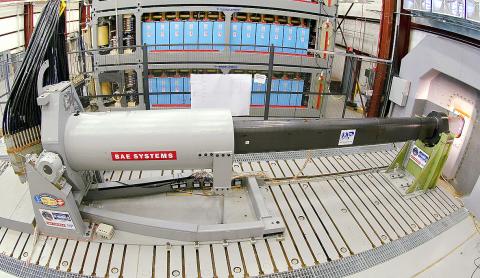New advances in the development of electromagnetic rail guns (ERG) could have a major impact on the defense of Taiwan, an expert in Asian military affairs said.
“[ERGs] could be ready by the early 2020s,” International Assessment and Strategy Center senior fellow Rick Fisher said.
US Navy officials revealed this week that they plan to test-fire a rail gun at sea for the first time in the summer of next year.

Photo: AP
The gun is to fire a series of hypervelocity projectiles fitted with GPS electronics at a barge floating in the ocean about 80km from Eglin Air Force Base in Florida.
Directed Energy and Electric Weapon Systems program manager US Navy Captain Mike Ziv told a US Navy League symposium that the first firing was a “significant event” and a “key learning point.”
The symposium was told that rail guns could fire guided, high-speed projectiles more than 160km and could be a formidable defense against cruise and ballistic missiles.
“This one technology has the potential to reverse the ‘cost-benefit ratio’ on the Taiwan Strait and to extend real deterrence potential for another decade, while allowing Taipei to sustain a largely defensive military strategy,” Fisher told the Taipei Times.
He said that Taiwan was buying US$3 million missile interceptors to shoot down US$1 million Chinese short-range ballistic missiles.
Rail guns could be able to shoot down Chinese missiles and attack aircraft with projectiles at much less cost.
“It can perform missile defense, air defense and anti-invasion missions, and also attack most of the new long-range anti-aircraft missile systems China is basing near the Taiwan Strait to threaten Taiwan’s air force,” Fisher said.
He said: “If China’s leaders see they cannot overwhelm Taiwan with missile strikes, achieve air superiority and thus assure the security of its invasion fleet, they will probably think more than twice about attacking Taiwan.”
“These are the potential benefits for Taiwan of the rail gun,” he said.
Fisher added: “It is a strategic and moral necessity for Washington to be working with Taipei to enable the early transfer of rail gun technology.”
According to the Defense Tech Web site, the rail gun being developed by the US Navy uses electricity to create a magnetic field to propel a kinetic energy projectile at about 5,600 miles per hour (9,000kph).
It can accelerate a 45-pound (20kg) projectile from zero to 5,000 miles per hour (8,046kph) in less than a second, the Web site said.
The projectiles, able to travel at 2,000 meters per second, would cost less than US$100,000 each, while the gun would be able to fire them at a rate of about one every six seconds.

NO LIVERPOOL TRIP: Taiwan’s Lin Yu-ting, who won a gold medal in the boxing at the Paris Olympics, was embroiled in controversy about her gender at that event Taiwanese boxer Lin Yu-ting (林郁婷) will not attend this year’s World Boxing Championships in Liverpool, England, due to a lack of response regarding her sex tests from the organizer, World Boxing. The national boxing association on Monday said that it had submitted all required tests to World Boxing, but had not received a response as of Monday, the departure day for the championships. It said the decision for Lin to skip the championships was made to protect its athletes, ensuring they would not travel to the UK without a guarantee of participation. Lin, who won a gold medal in the women’s 57kg boxing

RESPONSE: The transit sends a message that China’s alignment with other countries would not deter the West from defending freedom of navigation, an academic said Canadian frigate the Ville de Quebec and Australian guided-missile destroyer the Brisbane transited the Taiwan Strait yesterday morning, the first time the two nations have conducted a joint freedom of navigation operation. The Canadian and Australian militaries did not immediately respond to requests for comment. The Ministry of National Defense declined to confirm the passage, saying only that Taiwan’s armed forces had deployed surveillance and reconnaissance assets, along with warships and combat aircraft, to safeguard security across the Strait. The two vessels were observed transiting northward along the eastern side of the Taiwan Strait’s median line, with Japan being their most likely destination,

‘NOT ALONE’: A Taiwan Strait war would disrupt global trade routes, and could spark a worldwide crisis, so a powerful US presence is needed as a deterrence, a US senator said US Senator Deb Fischer on Thursday urged her colleagues in the US Congress to deepen Washington’s cooperation with Taiwan and other Indo-Pacific partners to contain the global security threat from China. Fischer and other lawmakers recently returned from an official trip to the Indo-Pacific region, where they toured US military bases in Hawaii and Guam, and visited leaders, including President William Lai (賴清德). The trip underscored the reality that the world is undergoing turmoil, and maintaining a free and open Indo-Pacific region is crucial to the security interests of the US and its partners, she said. Her visit to Taiwan demonstrated ways the

The US has revoked Taiwan Semiconductor Manufacturing Co’s (TSMC, 台積電) authorization to freely ship essential gear to its main Chinese chipmaking base, potentially curtailing its production capabilities at that older-generation facility. American officials recently informed TSMC of their decision to end the Taiwanese chipmaker’s so-called validated end user (VEU) status for its Nanjing site. The action mirrors steps the US took to revoke VEU designations for China facilities owned by Samsung Electronics Co and SK Hynix Inc. The waivers are set to expire in about four months. “TSMC has received notification from the US Government that our VEU authorization for TSMC Nanjing